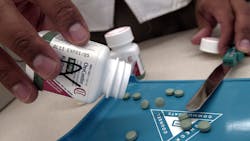Purdue Pharma Pleads Guilty to 3 Criminal Charges, Will Pay $8 Billion
The Justice Department announced October 21 that Purdue Pharma LP would plead guilty to three criminal charges and a settlement for a civil charge. The total money in settlements amounts to more than $8 billion but does not release any of the company’s executives or owners from criminal liability.
As part of the settlement, Purdue plead guilty to three counts of conspiracy. The first count was for attempting to defraud the United States; the second and third counts, for attempting to violate federal kickback laws. Additionally, Purdue admits that it impeded the Drug Enforcement Administration by reporting misleading information about the company’s drug diversion program.
According to the Justice Department, the resolution includes record penalties for a lawsuit against a pharmaceutical manufacturer. Purdue will pay $3.544 billion in a criminal fine, $2 billion in criminal forfeiture, and $2.8 billion to settle a civil complaint. Because the $3.544 billion is part of Purdue’s bankruptcy proceedings, though, it’s unlikely that all of that money will be collected by the government.
Steve Miller, chairman of Purdue’s board since July 2018, said “Purdue deeply regrets and accepts responsibility for the misconduct detailed by the Department of Justice in the agreed statement of facts.” In a statement, Miller said that resolving the Department of Justice investigations—which are still ongoing—“is an essential step in our bankruptcy process.”
“The settlement agreement will pave the way for Purdue to submit a plan of reorganization to the bankruptcy court that will transfer all of Purdue’s assets to a public benefit company, and ultimately deliver more than $10 billion in value to claimants and communities,” said Miller.
Miller added that Purdue has ended all opioid promotions to healthcare professionals, appointed new executives, accepted the resignation of all Sackler family members from the company board, and agreed to independent monitoring to ensure it does not promote further opioid products.
“Purdue today is a very different company,” he said.
Deputy Attorney General Jeffrey A. Rosen, in a statement, said “With criminal guilty pleas, a federal settlement of more than $8 billion, and the dissolution of a company and repurposing its assets entirely for the public’s benefit, the resolution in today’s announcement re-affirms that the Department of Justice will not relent in its multi-pronged efforts to combat the opioids crisis.”
The ruling was not quite strong enough for some Purdue critics. In a letter to Attorney General William Barr, 38 Democratic members of Congress wrote that “if the only practical consequence of your Department is that a handful of billionaires are made slightly less rich, we fear that the American people will lose faith in the ability of the Department to provide accountability and equal justice under the law.” Massachusetts Attorney General Maura Healey expressed her dissatisfaction with the agreement to the AP, saying the Justice Department had “failed.”
Purdue is currently fated to be remade into a public benefit company run by a trust bound to balance the company’s interests against those of Americans’ public health. The Sacklers, who currently still own Purdue, will not be involved in the new company.
About the Author
IW Staff
Find contact information for the IndustryWeek staff: Contact IndustryWeek
